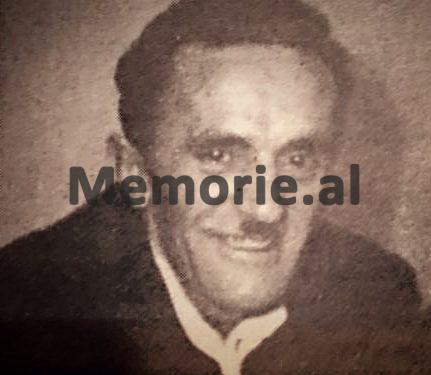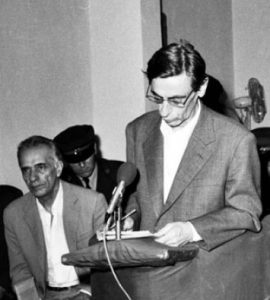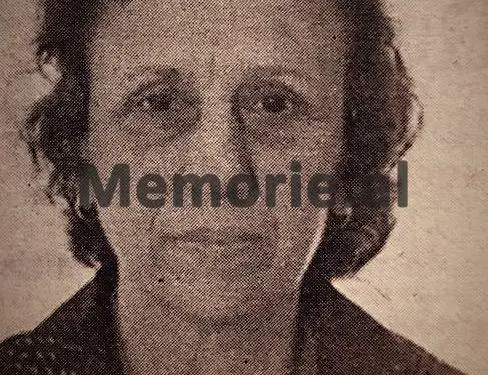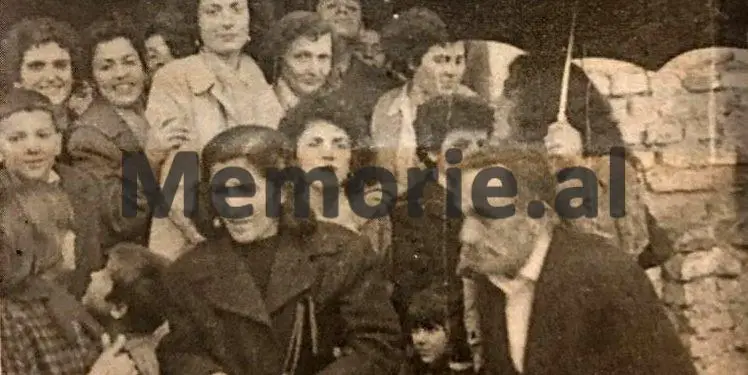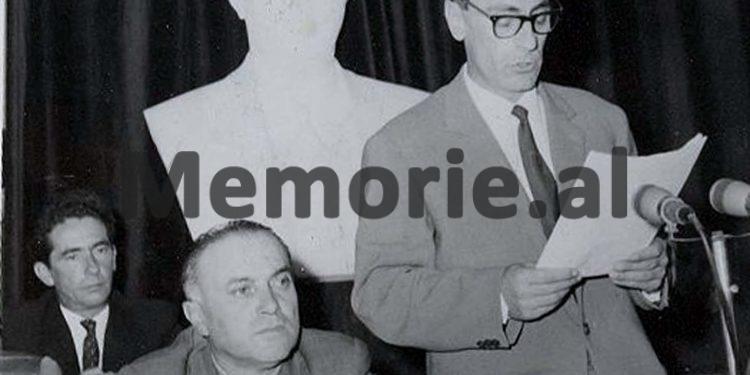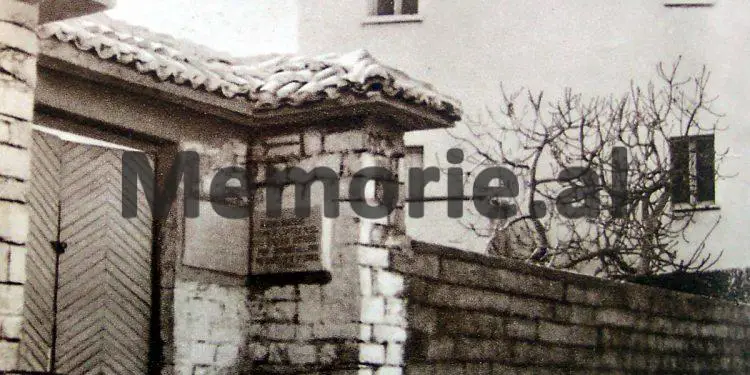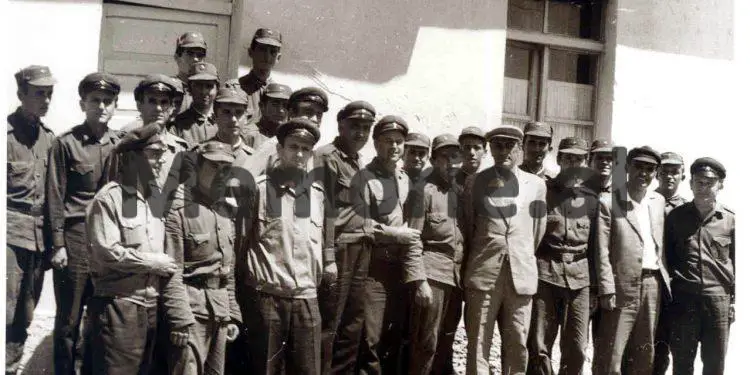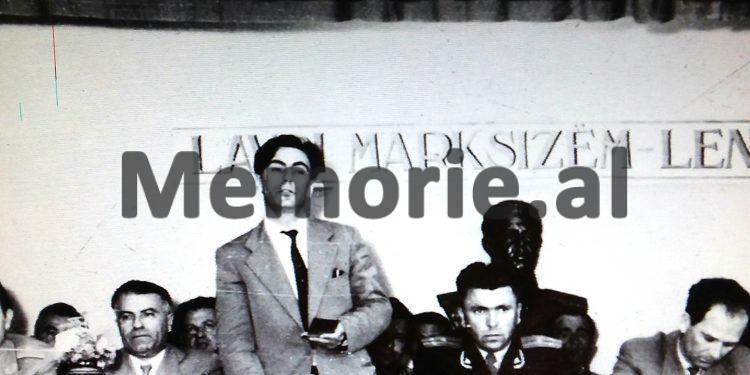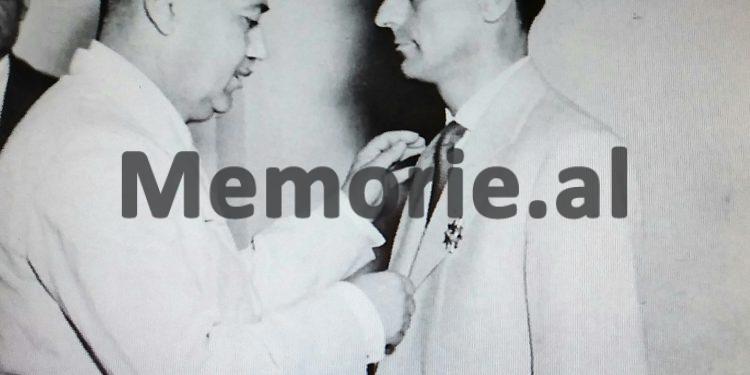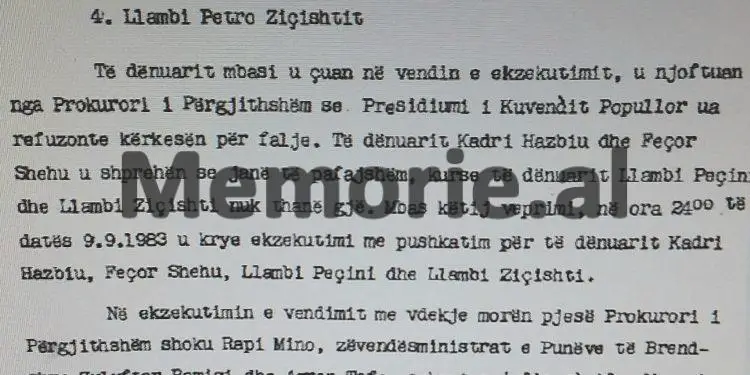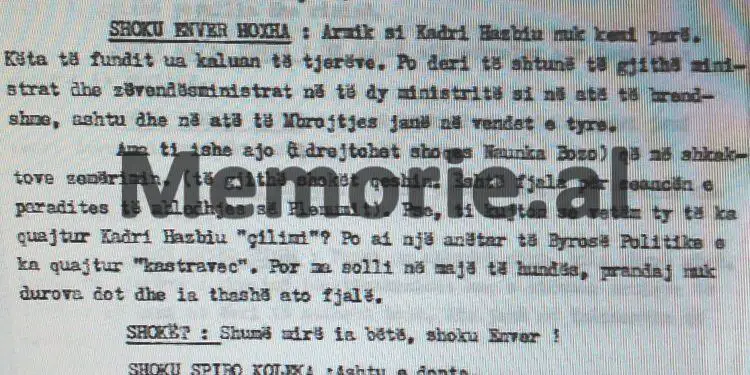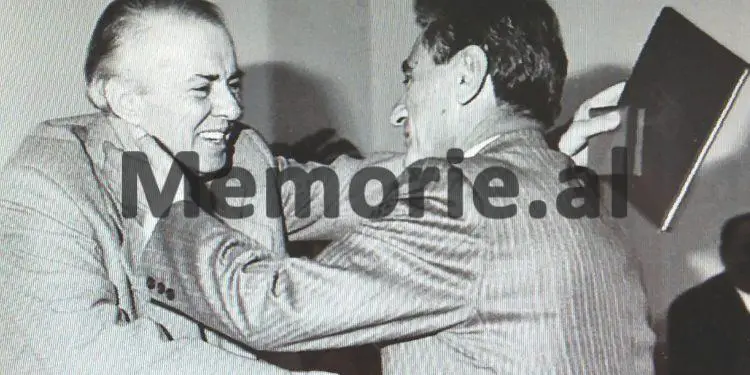Dashnor Kaloçi
Memorie.al publishes the unknown story of Hasan Hazbi, the brother of former member of the Political Bureau and Minister of Interior and Defense, Kadri Hazbi Dautaj, who was arrested by the State Security on October 11, 1982, just a few hours after his brother, Kadri, his subordinates had put the irons to send him to the cells of the Tirana Investigation, from where he would not come out alive! The rare testimony of Shqipe Hazbiu (Avdiu), the granddaughter of the former Minister of Interior and Defense of Enver Hoxha, about what happened to her uncle Kadri, after he was beaten by Enver and her father, Hasan, who was disappeared under mysterious circumstances in Zejmen Prison in 1986 and the vicissitudes of finding his remains only after the 90s
Mrs. Shqipe, did your father, Hasani, know the words that had spread about Kadri Hazbi, long before he was arrested, that he had allegedly escaped by plane with his whole family from Albania, and did he feel that even with him, he could did something happen
Undoubtedly, the father was aware of those words, since he and Kadri had excellent relations, but he did not tell us anything. At the time when those words were circulating about our uncle, Kadri, my husband Fatos (Avdiu) and I met by chance his son-in-law, Agron Aranitas, who when we asked him how he was, he told us: “You have not heard , have made us all fugitives. But don’t worry, because here we are.” This was the first signal we received at that time, before my father’s arrest. In August 1982, Enveri called Kadri in Pogradec and it is not known what they talked about. When he returned to Tirana, Kadriu went to Peza, but his visit was not shown on television like other times. After all that was happening, Hasan saw that something bad was happening, but he kept it to himself and didn’t say anything to us.
How do you remember your father’s arrest?
Our father, Hasan, was arrested on the afternoon of October 11, 1982, the same day that his brother, Kadriu, was also arrested. On the morning of October 11, which was a Saturday and I will never forget it, I went to my father to leave the key to my house, as I usually did, since our houses were very close. As he was escorting me to the door, my father told me: “Albania, when you go to school, work carefully!” After that I left the house, but those words of my father made a great impression on me, since he had never spoken to me in that way. At that time, I was working as a teacher at the “Ylli i Kuq” school, in Laprakë, and that afternoon, together with the team, I was invited to visit a friend of ours who was getting married. When we went to our friend’s house, all the chairs were taken and none of my colleagues invited me to sit. I felt coldness there, from all my friends, and I immediately remembered the words my father had said to me that morning. At the moment I thought something had happened, but I didn’t give up. After that, the secretary of the school party invited me to sit on a chair with her and started provoking me, asking me various questions.
At the time you were at your friend’s house to congratulate, was your father arrested, or only your uncle, Kadriu?
At that time, only my uncle, Kadriu, was arrested, while my father’s arrest happened that afternoon, when I returned home. I knocked on the door; it was opened for me by my stepmother Havaja (Progri), who signaled me not to speak. Meanwhile, I went inside and saw my father sitting cross-legged on the sofa; he had become the size of a fist. After kissing me on the forehead, he told me to go to the next room, where my brother Myfiti was, who had just been brought “package mail” from Sweden, where he worked as a commercial attaché at our embassy. Myfiti told me: “Be strong, because these jobs are like that”. And from the kitchen, my father told me: “Don’t leave Fatos (my husband) and do as he says. Now go, because the children have gone home and be careful, because your uncle and my brother have been arrested. The reasons are because the party knows. He was and is my brother and your uncle.”
What did you do next?
After his words, I immediately returned home and sat on the balcony, looking at my father’s house. After a few minutes, I saw my stepmother, Havana, who came out on the balcony and, looking at me, was waving at me with both hands. With great difficulty I understood that she was telling me that the tent of the house (as we from Vlora use for the master of the house) had been arrested. While I continued to stand on the balcony, Hawaii went inside and apparently, she prayed to the Security people, after a while the father, Hasan, came out on the balcony, accompanied by another man. He stood there for three or four minutes, without speaking, and then went inside again. After that I went inside and crying, I told Fatosi that the father had been arrested. Fatosi tried to calm me down, but I couldn’t control myself. The night my father was arrested, we could not sleep because we were so shocked.
Did you meet with Havana again to ask her what have happened to your father?
Yes, the next morning, when I went out to buy groceries, I saw Havana walking towards her house accompanied by a policeman. She motioned for me not to approach her, and when I followed behind her, I saw a truck at the entrance of her palace and some workers throwing her belongings from above as if they were trash. Hawaii stood in the rain without moving, watching her spoils being destroyed. Then the truck left for Lapardha in Berat, where her internment was decided. She stayed there in that village until 1991, together with her son, Ben, who was removed from the school of the Ministry of the Interior, where he was studying, and sent to Berat as a soldier.
After the arrest of your father, Hasan, what happened to the rest of you?
Three or four days after my father’s arrest, I was called to the Tirana Investigation, (where Prison 313 is today) and an investigator interrogated me. I was very shocked when I entered and when I asked the investigator if my father was there, he told me: “I ask the questions here.” After that he asked me if I had kept a postcard that my father had sent me on the occasion of my birthday, a long time ago. When I answered that she could be at home, he told me: “If you have the chance, send her to us with someone, so that you don’t have to worry about it yourself.” When I told him that I would take my son to them, he gave me the freedom to leave from there. When I went home, I found the postcard and sent it to them with my son Sokol (he was 20 years old at the time), who had been interrogated just like me, but their main goal was for Sokol to go there too. We learned this later, after two or three months, when Sokol was called as a witness in his grandfather’s trial.
Did you attend the trial and what did Sokol testify there?
No one informed us, but even Sokol never assisted in Hasan’s trial. When Sokoli came the first time, he was told that the trial had been postponed, as Hasan was allegedly ill. When he came the second time, he was told that it had been postponed for another day, and when he came the third time, he was told that he was late, as the trial had ended two hours ago. So none of us attended his trial and no one informed us how much Hasan had been sentenced. Not only that, but we didn’t know anything about where he could be and I learned this a few months later, when I was removed from education and taken to work as a worker in the Shoe Factory in Laprakë. In that enterprise, where I was treated in an excellent way, I learned that our father was in the prison of Zejmen, in Lezhë. This was said to me in a low voice by some workers who had their relatives in that prison. At first, I didn’t believe him, but then the secretary of the Party organization, who kept me close and treated me very well, told me.
After you found out where the father was, did you meet him?
To meet, we could not meet, with the exception of the son, Sokol, who was able to meet him only once for two or three minutes, in the Sanatorium of Tirana, where Hasan had been brought to be cured. But he was constantly sending us letters and postcards from the Zejmen camp, which stopped in April 1985, when he died there in prison.
How did you learn of his death?
We found out a long time later, when we met by chance in Tirana, our stepmother, Havana, who had come from exile to visit. She had been notified to go and take his spoils, in the prison, but she could not go, as she was sick of herself. Until 1990, we did not learn anything about the circumstances under which the father had died and we had no official announcement. In 1990, a Kosovar came to my house here in Tirana, who had just been released from Zejmeni prison. He asked me, as my brother Myfiti was still interned in Gjegjan i Puka. The Kosovar told us that he had been our father’s closest friend in Zejmen prison and that Hasan had given his life in his hands. That same day, he also showed us the place, where my father was buried (making a sketch, since the graves had no names, only numbers) and the name of the man who had taken care of those graves.
After that, did you find your father’s remains?
After 1991, when my brother Myfiti came to Tirana, he went to Zejme several times and found the old man who had taken care of the prisoners’ graves, who showed him Hasan’s grave, according to the number he had saved. After we found him, we took them and brought them to the Sharra cemetery in Tirana, joining them with the remains of his uncle, Kadri, and his son Gon, who died in the Kurbnesh mine. Since 1995, the remains of those three of our dearest people rest together there in the Sharra cemetery.
Enver’s hypocrisy: Congratulatory telegram to Hazbi before his arrest
Hasan Hazbi’s arrest on October 11, 1982, was not completely unexpected for him and his family, since Hasan had long felt that his brother Kadriu, former Minister of the Interior and member of the Political Bureau of the ALP Central Committee, since 1953, did not have good relations with Enver Hoxha. Since six months ago, Hasan had also heard all the words that had spread at that time, about his brother, Kadri, the Minister of Defense, who was said to have escaped in a military plane from Albania and had ended in the USA, with his whole family. Although it was not true, for Hasan and his family, it weighed heavily. Regarding the words that spread at that time about Kadri Hazbiu, his granddaughter Shqipe Hazbiu testifies: “Although we only heard words up and down, our uncle Kadriu knew and had felt earlier what was happening to him. Very late we heard that on the occasion of his birthday, on July 16, 1982, Enver Hoxha had sent Kadri a greeting, the letter of which was packaged in a beautiful colored folder. But when Enver’s people took it home, neither Kadri nor any of his family members bothered to read what was written there. This happened because Kadriu, better than anyone, knew the hypocrisy of Enver, who, before hitting you, washed and painted you. Thus, Enver’s greeting letter, with many praises for Kadri, ended up in the hands of his 6-year-old grandson, Moza’s son.
Who was Hasan, the only brother of Kadri Hazbi?
Hasan Hazbiu was born in 1915, in the village of Hysoverdhë in Vlora, from where the family of Hazbi Dautaj, one of the most famous villages of the Vlora River, came from, who in 1920 participated in the Congress of Lushnja as a delegate of chosen by the people of that province. Hasani was the eldest of Hazbi Dautaj’s sons, after him came Njaziu, who died very young, at the age of 20, and the youngest of them was Kadriu, who was born in 1922. The Hazbiu family has used to be a very rich family, which was engaged in livestock farming and in the properties of their house, until the beginning of the 40s, four or five argots worked continuously. Due to the good economic situation, both of Hazbi’s sons, Hasan and Kadriu, were first educated at the Commercial School of Vlora, but Hasan could not finish it, since, after the death of his father, Hazbiu, he interrupted it and returned to the village to shoulder the burden of the family. With the beginning of the Anti-Fascist Movement, in the 40s, Hazbi Dautaj’s house became one of the main bases, putting everything at the service of the partisans, where Hasani and Kadri were framed. At the end of the war, while Kadriu came to Tirana, where he was appointed as the Chief of Army Security, his brother, Hasani, stayed in the village, where he was elected Chairman of the People’s Council for the province of Drashovica. In that function, Hasani stayed until 1951 and at that time he came to Tirana to stay close to his sick wife, Salusha, who during the War was constantly busy with the reception and escort of the partisans, cooking and bread for all that great house, which was never empty. Sometime after the death of Salusha (with whom he had two children, Shqipa and Myfiti), Hasan was forced to remarry Hava Progri, with whom he had only one son, Ben. After coming to Tirana, Hasani started working in the company “Rruga Ura”, (then he became the Chief of Staff) and lived as a tenant until 1981, when he got a house on “Myslym Shyri” street. Hasani remained in the position of Chief of Staff at “Rruga Ura” until October 11, 1982, when he was arrested by the Security, the same day that his brother, Kadriu, former member of the Political Bureau, Minister of the Interior and The defense of Enver Hoxha, whom he served to the end with a rare loyalty and perhaps without ever realizing that one day he too would be his victim?!/Memorie.al




